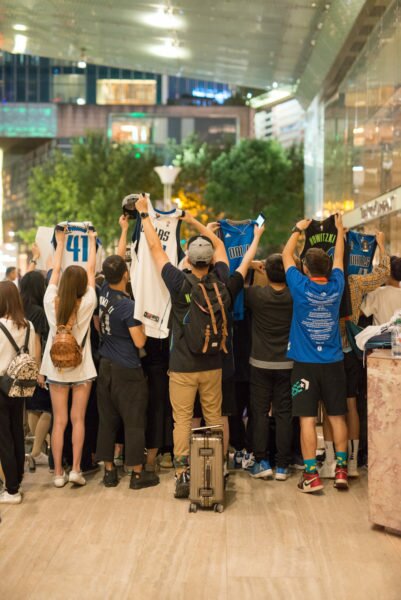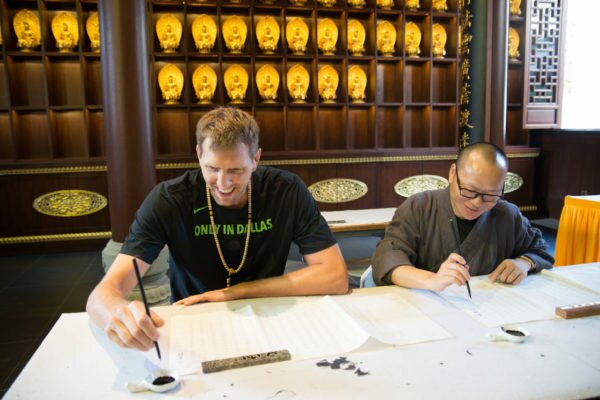Shanghai, October 2018: On the driveway to the Ritz-Carlton Shanghai, Pudong, hundreds of fans stand day and night, waiting for Dirk. Neatly corralled behind barriers, all, really all of them are wearing his jersey with the number forty-one—even though the Mavericks now have quite popular young players too, like Luka Donćić or Dennis Smith Jr. They, however, stand in the lobby, marveling, when Nowitzki walks the few yards from the hotel door to the bus and the crowd erupts, the shrieks deafening, as if the Mavericks were the Beatles and the year 1966. »What a circus!« he exclaims when he signs autographs, when his fans climb over each other trying to somehow get to him, when the barricades wobble out of sheer love, when the team bus finally drives away, honking. »What a circus!« Dirk says in the very back of the bus, but you can tell by looking at him that despite all the stress he appreciates the affection. »One more time.« He smiles. Several months ago he turned forty. He pulls the curtain on the bus window aside and waves. He doesn’t look unhappy.
 The Mavericks have been sent to China for two preseason games against the Philadelphia 76ers, with the aim of boosting the NBA’s popularity in its most important international market. Not that this is really necessary in China: The Chinese love basketball with a strictly organized obsessiveness, with an orchestrated fervor unknown even in the US, the motherland of basketball. Here there’s no chaotic cheering, here there’s orderly jubilation, a peculiar mixture of rigid structure and deregulated commerce. Nowhere else do merchandise and streaming subscriptions sell so well. The Mavericks came on three airplanes carrying, along with a number of containers full of equipment, the team and its owner, coaches and PR people, cheerleaders and sponsors—a convoy of more than two hundred people. The Texas traveling circus is in town, and Dirk is its main attraction.
The Mavericks have been sent to China for two preseason games against the Philadelphia 76ers, with the aim of boosting the NBA’s popularity in its most important international market. Not that this is really necessary in China: The Chinese love basketball with a strictly organized obsessiveness, with an orchestrated fervor unknown even in the US, the motherland of basketball. Here there’s no chaotic cheering, here there’s orderly jubilation, a peculiar mixture of rigid structure and deregulated commerce. Nowhere else do merchandise and streaming subscriptions sell so well. The Mavericks came on three airplanes carrying, along with a number of containers full of equipment, the team and its owner, coaches and PR people, cheerleaders and sponsors—a convoy of more than two hundred people. The Texas traveling circus is in town, and Dirk is its main attraction.
In the late afternoon, on the fifty-third floor of the Ritz-Carlton, with a view of the Yangtze River, he works through his fitness program, dripping and panting on a stepper. After a few clear blue days, a thick haze now lies over the city once again. The river flows by sluggishly below us, the cruise ships flashing. The fitness room has been sealed off for half an hour, but a few fans in Nowitzki jerseys have finagled their way to the doors. Most of them have booked rooms here specifically because of him: 3500 yuan a night, about $500, to catch a glimpse of Dirk. He has thirty focused minutes for his cardio program, then word has leaked that he’s up here. Then he has to clear out.
His ankle surgery was six months ago now. Since then he has been working on conditioning his body for the upcoming season. Dirk looks thin, even more angular and gangly than usual; he adheres strictly to his dietary regimen. In twenty-one years he has not weighed as little as now, and back then, his first year in the league, he was a nineteen-year-old beanpole with an incredible metabolism, not an ounce on his ribs—and not a clue how to cook pasta. After the surgery everything was at first going according to plan, but then a tendon in his foot became inflamed. The new mobility was too much for it. At the moment basketball is out of the question, he won’t be playing in Shanghai. He has to wait and stay in shape.
His hotel room on the forty-ninth floor looks out on the flashing buildings on the riverside, behind them residential high-rises as far as the eye can see. 1.4 billion people live in China, 300 million of them basketball fanatics. Somewhere in the twilight is the sea. Nowitzki is freshly showered, his suit for the evening already hanging on the wardrobe, the air in the room steamy from the iron. His toes are stuck in two bilious-greenplastic separators that are supposed to improve the mobility of the foot. This evening the schedule continues with a gala in the Shangri-La, then a players-only dinner at which he will order water, then back to the hotel to somehow sleep off the jet lag. He has been doing it for years. A seasoned long-distance traveler, he is well-versed in time differences. Over all these years he has flown an estimated fifty-five times around the earth.
The next morningNowitzki slips out of the hotel to see at least a tiny bit of China beyond the packed schedule. Even though it’s a game day, he is set on doing this. We ride through the city on a minibus, with only two or three friends, security and the chaperone. We leave the tourist quarter on the river and turn into the courtyard of the Jade Buddha Temple, bordered by cedars with twittering birds. Two monks receive Dirk. Hospitality gifts are exchanged, and then we get a tour of the empty temple. Dirk stands in front of a chest of ancient scriptures, observes the incense wavers in the courtyard, asks about the calligraphy workshop, the Buddhas and prayer benches, listens to the gongs and chants. The monks tell him how they roll out the baskets in the evening and play three-on-three in the inner courtyard, and Dirk can hardly believe it. No one is jostling, no one is screaming his name, an unexpected calm comes over the tour group. When we stand in front of a huge Buddha, Nowitzki is told to make a wish. Any wish.
During the concluding tea ceremony (»Best tea I’ve ever had!«), photographers are present once again, and outside the temple later Nowitzki does have to sign a few more autographs. As quickly as we came, we’re off. Dirk got a year’s supplyof green tea. When the bus stops at a traffic light on the way back, one of the security people asks what Dirk wished for. A long life? Happiness? Money? Laughter on the bus. »A good left foot,« says Dirk.
During the days in Shanghai Dirk meets the Chinese basketball superstar Yao Ming, who is half a head taller than Dirk, he meets the African legend Dikembe Mutombo, he rides the elevator up with Julius »Dr. J.« Irving. Dirk stands up well next to the other legends, but there’s no museum aura around him. He is not here because he wants to be rewarded for his achievements. He wants to play.
He packs up his suits, books, sneakers and takes the second bus to the arena. He watches the city passing by outside the window, all those lights, all those people, the arena on the river. »What a circus!« This evening he will at least sit on the bench. In sportswear, not in a suit.
 Before the game against the 76ers Dirk puts two folding chairs in the hallway outside the locker room, among mops and buckets. Around us is the bustle of preparation for the spectacle. Dirk’s teammates stop by on their way to the locker room, fist bumps and high fives, a few barked insults and jokes, a few of the boys are barely half his age. He’s making progress, says Dirk, his foot is making progress. But it will definitely be a while before he can play again. All that matters is next spring, he says, when the games really start to count.
Before the game against the 76ers Dirk puts two folding chairs in the hallway outside the locker room, among mops and buckets. Around us is the bustle of preparation for the spectacle. Dirk’s teammates stop by on their way to the locker room, fist bumps and high fives, a few barked insults and jokes, a few of the boys are barely half his age. He’s making progress, says Dirk, his foot is making progress. But it will definitely be a while before he can play again. All that matters is next spring, he says, when the games really start to count.
All that matters is this world.
The game gets off to a bumpy start. Occasionally Dirk’s face is shown on the huge cube over our heads, China loves you! He laughs. He doesn’t actually want any farewell gifts, but in a break between quarters his old teammate Wang Zhi Zhi hands him a guitar, strum, strum, strum, next season is music to his ears. When the game is over, the buses roll in the yellow glow of the parking lot lights. Toward the airport, toward Shenzhen, toward America. We watch him leave, but Dirk is facing forward.
This translation is part of a longer report which was published in the print-version of WELT AM SONNTAG: At Dirk Nowitzki’s training session in Randersacker, on a road trip along the West Coast, in Dallas and Shanghai. More here.